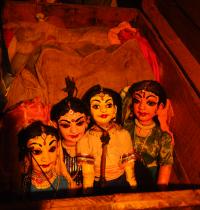Dr S Murugaboopathy
Grant Period: Over nine months
This grant supports Kovilpatti-based theatre director S. Murugaboopathy to undertake research into the socio-cultural, historical and psychological understandings of doll traditions in Tamilnadu towards creating a performance script.
Murugaboopathy’s fascination with bommais (dolls, in Tamil) goes back to his childhood. He recalls how as a child, he would ask his friends to freeze into different bommai positions or would create plays using borrowed dolls as properties. This fascination continued to inspire him later too, when he started his theatre group ‘Manalmagudi’ in Kovilpatti. While working with children, he used quite a bit of doll-based theatre practice and realised how audiences invariably build an intimate and creative relationship with actors (as dolls) and with the performance itself. Many of his award-winning directorial works have been influenced by the rich doll traditions in Tamilnadu.
Boopathy’s research into and his engagements with some of the doll traditions of Tamilnadu, have brought a deep understanding of how bommais are an integral part of its socio-cultural life. Domestic, agrarian, ritual or religious dolls - each of them has a distinct body language, and cultural and historical specificities. They have always been integral to the community’s sense of heritage and identity. ‘There are dolls like scarecrows used in fields; dolls of animals used in festivals; large dolls of local deities within temple complexes; evil eye dolls on houses and many more’, Boopathy notes in his proposal. ‘And each of these has its own story. Some dolls are not fully formed, some are scattered, dismantle-able and perishable, some are static and some, mobile. Over a period of time, the dolls become institutionalised and preserved, within temples, museums or markets, while their oral stories get written and standardised’, he says. Therefore, to him, dolls seem to inhabit a parallel universe that is replete with its own myths, movements, language, songs and politics.
As a theatre practitioner, Boopathy finds it fascinating to study the nuanced socio-cultural and performative elements that exist in these doll traditions. This, he believes would enable his group Manalmagudi to create a new theatre vocabulary in terms of acting and inspire new engagements with spaces and audiences.
The research will especially focus on specific doll traditions in the southern Tamilnadu region, especially in Ramanathapuram, Madurai, Virudhunagar, Thirunelveli and Toothukudi districts. Boopathy and his team of actors will particularly study the Kulashekharapattinam Navaratri festivities where large dolls of goddess Kali are taken out in procession, the dolls of the Masikkalari festival in Ramanathapuram, the cloth doll gods of the Narikuravar community and the Marapachi healing and ritual dolls. They will gather material from libraries and archives and study sculptural expression of dolls in major temples in Madurai, Srivilliputhur, Thanjavur, Kazhugumalai and other places. Further, they will also workshop with two traditional puppeteers from Salem in order to understand movement and performance techniques of dolls.
The outcome of the research will be a performance script. This script will subsequently lead to the creation of a theatre production.





